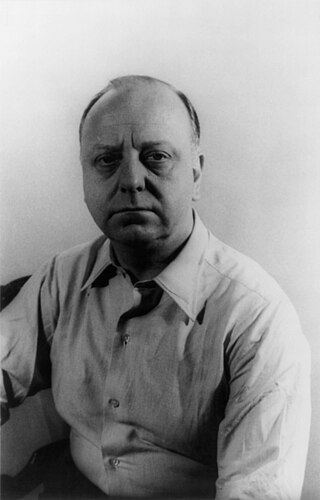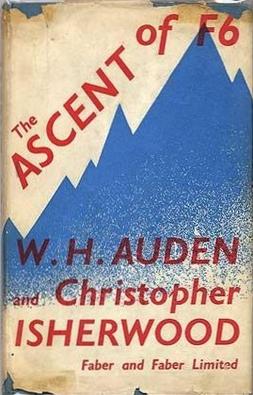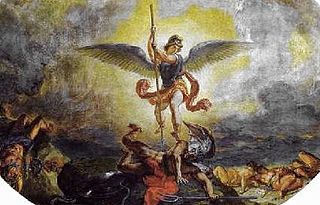Related Research Articles

Virgil Thomson was an American composer and critic. He was instrumental in the development of the "American Sound" in classical music. He has been described as a modernist, a neoromantic, a neoclassicist, and a composer of "an Olympian blend of humanity and detachment" whose "expressive voice was always carefully muted" until his late opera Lord Byron which, in contrast to all his previous work, exhibited an emotional content that rises to "moments of real passion".

Songs of Innocence and of Experience is a collection of illustrated poems by William Blake. Originally, Blake illuminated and bound Songs of Innocence and Songs of Experience separately. It was only in 1794 that Blake combined the two sets of poems into a volume titled Songs of Innocence and of Experience Shewing the Two Contrary States of the Human Soul. Even after beginning to print the poems together, Blake continued to produce individual volumes for each of the two sets of poetry.

Noye's Fludde is a one-act opera by the British composer Benjamin Britten, intended primarily for amateur performers, particularly children. First performed on 18 June 1958 at that year's Aldeburgh Festival, it is based on the 15th-century Chester "mystery" or "miracle" play which recounts the Old Testament story of Noah's Ark. Britten specified that the opera should be staged in churches or large halls, not in a theatre.
Boosey & Hawkes is a British music publisher, purported to be the largest specialist classical music publisher in the world. Until 2003, it was also a major manufacturer of brass, string and woodwind musical instruments.
Jack Hamilton Beeson was an American composer. He was known particularly for his operas, the best known of which are Lizzie Borden, Hello Out There!, and The Sweet Bye and Bye.

Hymn to St Cecilia, Op. 27 is a choral piece by Benjamin Britten (1913–1976), a setting of a poem by W. H. Auden written between 1940 and 1942. Auden's original title was "Three Songs for St. Cecilia's Day", and he later published the poem as "Anthem for St. Cecilia’s Day ".
Tiriel, Op. 41, is a 1985 opera by the Russian composer Dmitri Smirnov in three acts with a symphonic prologue to his own English libretto after a poem of the same title by William Blake. It has been translated into Russian and German. It was first performed at the Stadttheater Freiburg on 28 January 1989.
Nocturne, Op. 60, is a song cycle by Benjamin Britten, written for tenor, seven obbligato instruments and strings. The seven instruments are flute, cor anglais, clarinet, bassoon, harp, French horn and timpani.

The Ascent of F6: A Tragedy in Two Acts, by W. H. Auden and Christopher Isherwood, was the second and most successful play in the Auden–Isherwood collaboration, first published in 1936. It was a major contribution to English poetic drama in the 1930s. It has been seen as a parable about will, leadership and the nature of power: matters of increasing concern in Europe as that decade progressed.
Old American Songs are two sets of songs arranged by Aaron Copland in 1950 and 1952 respectively, after research in the Sheet Music Collection of the Harris Collection of American Poetry and Plays, in the John Hay Library at Brown University. Originally scored for voice and piano, they were reworked for baritone and orchestra.

The Little Sweep, Op. 45, is an opera for children in three scenes by the English composer Benjamin Britten, with a libretto by Eric Crozier.
Cradle Song may refer to:

The Company of Heaven is a composition for soloists, speakers, choir, timpani, organ, and string orchestra by Benjamin Britten. The title refers to angels, the topic of the work, reflected in texts from the Bible and by poets. The music serves as incidental music for a mostly spoken radio feature which was first heard as a broadcast of the BBC in 1937.
John Phillip (fl.1561) was an English poet and dramatist of the Elizabethan era.

"A Cradle Song" is a poem written by William Blake in 1789, as part of his book Songs of Innocence.
Songs and Proverbs of William Blake is a song cycle composed by Benjamin Britten (1913–76) in 1965 for baritone voice and piano and published as his Op. 74. The published score states that the words were "selected by Peter Pears" from Proverbs of Hell, Auguries of Innocence and Songs of Experience by William Blake (1757–1827). It was premiered at the Aldeburgh Festival in June 1965 by the composer and the German baritone Dietrich Fischer-Dieskau (1925–2012). The critic William Mann thought that the cycle would be judged "Britten's deepest and most subtle song-cycle"; and John Warrack wrote in The Daily Telegraph that Britten "has, I feel, here come to terms with the darkness and sense of cruelty that has always stalked his art".

Children's Crusade, Op. 82, subtitled a Ballad for children's voices and orchestra is a composition by Benjamin Britten. He completed it in 1969, setting Bertolt Brecht's poem Kinderkreuzzug 1939 for children's choir with some solo parts, keyboard instruments and an array of percussion, to be performed mainly by children. It was first performed in an English version at St Paul's Cathedral in London on 19 May 1969.

Canticle IV: The Journey of the Magi, Op. 86, is a composition for three male solo voices and piano by Benjamin Britten, part of his series of five Canticles. It sets the text of T. S. Eliot's poem "Journey of the Magi", retelling the story of the biblical Magi. The work was premiered in June 1971 at the Aldeburgh Festival by James Bowman, Peter Pears and John Shirley-Quirk, with Britten as the pianist. It was published the following year, dedicated to the three singers.

Canticle II: Abraham and Isaac, Op. 51, is a composition for tenor, alto and piano by Benjamin Britten, part of his series of five Canticles. Commissioned to be performed as a fundraiser for the English Opera Group, it sets the story of Abraham and Isaac from the Chester Mystery Plays. Britten assigned the tenor voice of Peter Pears to Abraham, the alto of Kathleen Ferrier to Isaac, and both singers singing in homophony to the voice of God. The work was premiered on 20 January 1952 by Pears and Ferrier, with Britten as the pianist. It was published by Boosey & Hawkes in 1952, dedicated to the singers.
References
- ↑ "A Cradle Song (Blake, 1794)". wikisource.org. Retrieved 30 December 2014.
- ↑ This version of the poem differs from that of the same name in Blake's Songs of Innocence and of Experience .
- ↑ Johnson, James (1839). "The Scotish [sic] Musical Museum". Edinburgh: William Blackwood & Sons. p. 486. Retrieved 30 December 2014.
- ↑ Greene, Robert. "Sephestia's Lullaby". poetry-archive.com. Retrieved 30 December 2014.
- ↑ Hazlitt, W. Carey (1875). "Poetical and Dramatic Works of Thomas Randolph of Trinity College, Cambridge". archive.org. London: Reeves and Turner. Retrieved 30 December 2014.